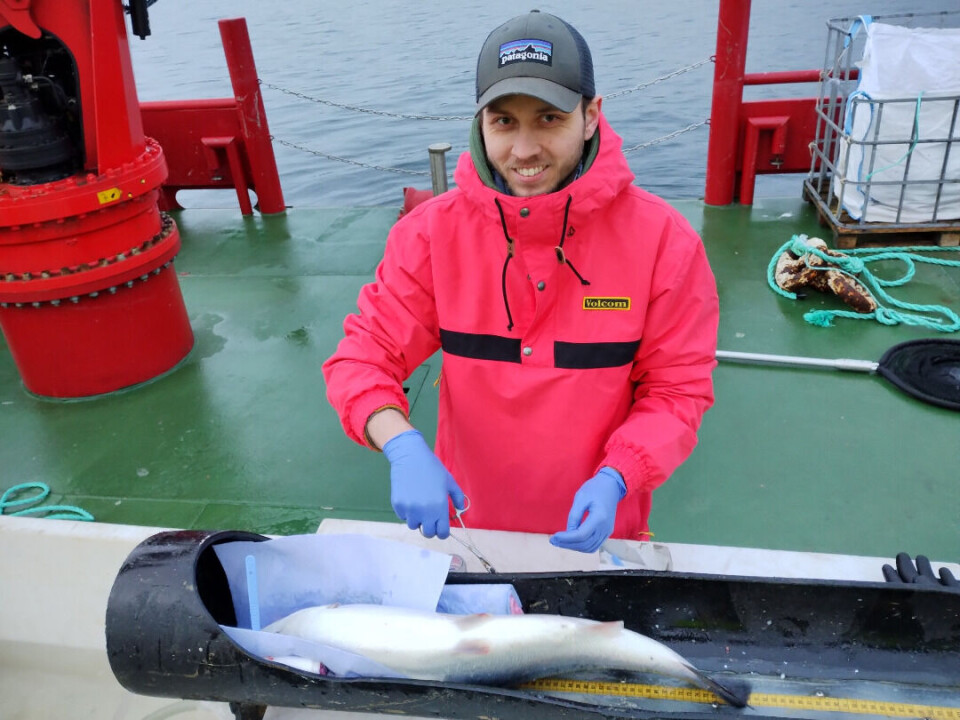THIS CONTENT IS BROUGHT TO YOU BY Nord University - read more

Can salmon live well with smart tags in their bellies?
Electronic chips do not affect the health of the fish carrying it, at least not in the short term.
“When fish aren't doing well, they often show signs of negative emotions such as fear, pain, and anxiety. This is as an expression of a stress response,” researcher Miiro Virtanen says.
How can we know how the salmon are doing?
Fish welfare is receiving increasing attention in the aquaculture industry, and breeders are now using new methods to monitor the health of each individual fish.
Smart tags, small electronic chips implanted in the bellies of selected individuals, are viewed by many as a promising method for monitoring welfare in the pens.
“Development of such implants to monitor fish welfare is underway, equipped to measure a variety of things, such as activity, heartbeat, pressure, temperature, and position in combination with observing the fish's behaviour,” Virtanen says.
Stress hormones in the blood

He recently completed his industrial PhD at Nord University, in collaboration with Arctic Seafood Group AS. Virtanen studied how such implants affect the health of the fish that carry them.
He particularly looked at how the implant affected stress hormones like cortisol in the fish's blood.
Cortisol is central to the body's stress response and is released in the body when exposed to a stressful situation. Such situations can include persistent pain, changes in temperature, poor water quality, and crowding.
“Seven days after the procedure, we found no difference between fish that had received implants and those without. However, it's important to note that our experiment ended after eight weeks. Therefore, we need more data on how the fish are affected over longer periods. This is something for future research,” Virtanen says.
Wounds heal slower under stress
In the study, researchers also looked at how fish that had received implants reacted to stress.
They did this by simulating crowding. Every day, the water level was reduced for a short period, so that at its lowest, the water only covered half of the fish's body. After 30 seconds of such extreme water levels, it was raised back to normal again.
“It was when we induced stress that we saw things start to go wrong. By the end of the experimental period, cortisol levels remained elevated,” Virtanen reports.
At this point, the experiment was concluded.
“It would be unethical to subject the fish to such extreme conditions, with severe chronic stress where the fish would most likely die,” he says.
In the study, Virtanen also looked at the development of fin erosion and, notably, the impact on wound healing. The results showed that wound healing was particularly affected when the fish were subjected to stress.
“Simply put, the results show that stress is negative for wound healing,” Virtanen says.
Proper training ensures best care
Skin health is a good parameter for fish welfare.
“Many diseases, parasites, environmental, and mechanical damage manifest on the skin. Therefore, changes in the skin condition can serve as a useful indicator of potential stress or health problems,” the researcher says.
This means that a number of considerations must be taken into account when implanting such devices in salmon.
“Ideal conditions should be ensured. Tagging fish that are already under chronic stress, for example during long periods of handling events, sea lice infestation, or bad weather, is a bad idea,” says Virtanen.
Experiments have also shown that the heart rate in fish that have implants inserted goes down more quickly after surgery when the procedure is performed by an experienced person.
“Proper training of the personnel performing the procedure is important. You must have a good plan. The goal is always that the fish should be provided the best possible care,” he says.
Reference:
Virtanen et al. Chronic stress negatively impacts wound healing, welfare, and stress regulation in internally tagged Atlantic salmon (Salmo salar), Frontiers in Physiology, vol. 14, 2023. DOI: 10.3389/fphys.2023.1147235
———
Read the Norwegian version of this article at forskning.no

This content is paid for and presented by Nord University
This content is created by Nord University's communication staff, who use this platform to communicate science and share results from research with the public. Nord University is one of more than 80 owners of ScienceNorway.no. Read more here.
More content from Nord University:
-
Kateryna's university has been bombed three times – but she's still teaching
-
5 things you didn't know about smart cities in the Arctic
-
AI sparked an idea that could improve road safety in Norway
-
These algae have been adapting for hundreds of millions of years
-
Could traces of bacteria in water combat salmon disease?
-
Bladderwrack in animal feed has the potential to reduce methane emissions




































